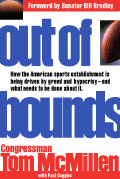Could the Government End the Mess in College Sports
Opinion
From The Chronicle of Higher Education
A bipartisan commission to reform amateur athletics is vitally needed now
Last week the NCAA, the cartel controlling college sports, received two massive shocks. One was self-administered: That was the ruling in the Big Five decision, when the NCAA’s Division I Board of Directors approved a plan to give the five wealthiest athletic leagues—the Atlantic Coast, Big Ten, Big 12, Southeastern, and Pacific-12 Conferences—the ability to provide extra benefits to their athletes. It was a plan that, had it not been approved, could have led to widespread defection from the NCAA itself. Next came the ruling in the O’Bannon case, in which the judge decided that the NCAA’s insistence that college athletes must be amateurs had violated the nation’s antitrust laws.
Anyone can see what’s coming next. The NCAA will certainly appeal the O’Bannon decision; other challenges to the NCAA will fill the dockets; and the current chaos in college athletics will drag on and intensify. Meanwhile, the charade of “student-athletes” and the blatant commercialism of college sports will continue for many more years; big money sports will go on corroding the core educational purposes and values of our colleges; and the tail will still wag the dog at U.S. institutions of higher education.
Nearly everyone recognizes the corrupting effect of money on college sports, but after decades of incremental reform—and despite the modifications of last week—too little has changed. There has been no real effort to curb the massive spending in college sports, which is financially and morally bankrupting our institutions of higher learning. What’s needed is not a chain of snail-paced changes but a fundamental restructuring of college athletics. Hoping this could happen may seem wishful thinking at best, but there is a precedent for such reform.
Although it’s hard to believe, given the current wild dysfunction in our government, there was a time when a president (Gerald Ford) and Congress worked together to settle a dispute among the various entities governing amateur sports.
After the dismal performance of the United States in the 1972 Munich Olympics, President Ford decided that the success of U.S. athletes in the Olympics and other international sports events should be a special priority. Intense differences of opinion on how to recruit and support the best athletes led Ford to create in June 1975 the President’s Commission on Olympic Sports to study the issue. The commission was bipartisan, with some members appointed by the president and others appointed by the speaker of the House of Representives and the president pro tempore of the Senate.
The commission eventually determined that squabbling among the Amateur Athletic Union (AAU), National Collegiate Athletic Association, and the U.S. Olympic Committee (USOC) was complicating efforts to recruit the most talented athletes.
This conclusion led to the Olympic and Amateur Sports Act of 1978, which granted the United States Olympic Committee monopoly status to govern all of our Olympic efforts, control all broadcasting contracts, and eliminate the conflicts between the NCAA and the AAU that were limiting U.S. Olympic medal successes and athletes. And one provision of the law gave the athletes themselves, for the very first time, a voice, voting power, and a framework for addressing grievances. Over the subsequent 36 years, this legislation has had great success in focusing and coordinating our Olympic efforts.
I believe that a similar presidential commission, focusing this time on intercollegiate athletics, is vitally needed now. President Obama could appoint a bipartisan committee, asking members of Congress to examine the imbalance between sports and academics at American colleges and universities.
There are many reforms that such a commission could consider. Should the distribution of NCAA revenue be based on the academic performance of the athletes, compliance with Title IX, and the breadth and diversity of the sports program overall, and not on the frequency of tournament appearances? Could a lid be placed on escalating costs, including the salaries of coaches, which at too many schools dwarf those of presidents and faculty? If a college leaves the NCAA and strikes its own media deal, would its athletic department lose its non-profit status?
Perhaps the most basic question is this one: Should Congress pass legislation granting an antitrust exemption to the NCAA, like the one granted to the Olympic Committee? This new monopoly would give the NCAA the authority to control all college sports television contracts, in contrast to the current situation in which TV executives can pit schools against each other, and powerful conferences that control astounding amounts of money can issue orders to presidents and public institutions. Under such a monopoly, never again would a television network dictate the game time to a college president or compromise a student-athlete’s ability to attend classes.
As Len Elmore, my fellow team member at the University of Maryland—a true student/athlete and a graduate of Harvard Law—recently said to Bloomberg News, “Congress may have a responsibility to invoke its power, provide the carrot of an antitrust exemption to let the sheriff come in, and tame the Wild Wild West.”
It may be that Congress is the only institution in the U.S. with the power to bring comprehensive reform to college sports. Without legislation to restore the balance between sports and academics at American colleges and universities, expect the money war to continue and escalate, with the values of education given no more than lip service.
C. Thomas McMillen, a former college and professional basketball player and a former Democratic representative from Maryland, is a regent of the University System of Maryland.








